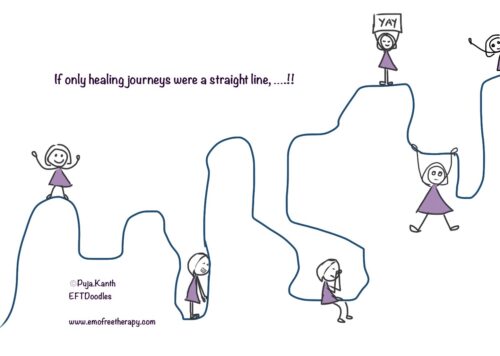After avoiding hysterectomy for the past couple of years, I finally made up my mind to go through it two months ago.
A little background
For years I managed my painful period with EFT. I had debilitating pain every month which left me bed-ridden affecting every sphere of my life. With the help of EFT, I was able to ease the frustration and angst that this caused, and take 5 days off every month to rest.
I was diagnosed with PCOD (Polycystic Ovarian Disease) at a young age and then with fibroids. Neither of these conditions were deemed serious enough for surgery, hence my doctor never suggested it. However, about 2 years ago, my doctor finally asked me to go for hysterectomy as my health was deteriorating and it was affecting my quality of life.
Last year when my period started getting worse and started coming twice a month, I knew that I had to decide quickly, but I was petrified of undergoing surgery. I wanted to be sure that I had exhausted all the possibilities of healing my uterus, which in my opinion, I had.
Tapping before surgery
In order to prepare myself for surgery I did a lot of self-tapping and a few sessions with tapping buddies.
Some of the aspects were:
“Even though I’m not sure if this surgery is the right choice, ….”
“Even though I’m scared of surgery,…”
“Even though I’m afraid of general anesthesia, ….”
All this helped in going through the numerous tests and checkups calmly. I was in a Zen like state on the day of the surgery.
But things went downhill right before surgery, emotionally.
When the nurses were prepping me for surgery, they messed up the IV and the intense pain along with the unkindness of one nurse broke my resolve. I was crying right before surgery but I kept tapping on my finger points throughout. My surgery went longer than usual due to some minor complication. The two days that I spent in hospital after surgery felt like a punishment! It was my first hospitalization and I was not prepared, and in a lot of pain. I had tapped so much for undergoing surgery but I forgot to address the aftermath of surgery. In my naïveté or wishful thinking that everything would be miraculously okay after surgery, I didn’t factor in the recovery phase as being difficult.
At one point, the pain was so debilitating, that I tapped on:
“Even though it’s so debilitating, and I feel like I might die, I’m surrendering to the pain and this process.”
This helped calm my nerves and I was able to tolerate more pain as the painkillers were not that effective initially. The rest of the stay in the hospital was filled with small mishaps that left me feeling helpless. These small t’s (traumas) added up and I spent the next 2 months tapping on all of it.

Struggling with symptoms
As I struggled with ongoing pain, digestive issues, toothache from hell, and food poisoning, during the two months, I frequently felt hopeless and overwhelmed. My biggest fear was ending up in the hospital again.
Some of the aspects I tapped on were:
“Even though my suffering doesn’t seem to end, …”
“Even though I’m not sure when it’ll end, I want to remind myself that I am recovering in small ways everyday.”
“Even though I feel like I’m being punished, …”(This brought up some childhood hurts and I worked on them)
“Even though I’m so angry at the nurses for how unkind they were, … “( Tapped on the VAKOG of this experience)
“Even though I felt hopeless and helpless during my hospital stay, …”
“Even though it’s been a very challenging journey, I would love to have some compassion for myself.”
“Even though I might end up in the hospital again, and although the chances are slim, if it happens it happens. I choose to now come back to the present moment.”
Following a daily tapping routine
I incorporated some positive statements and cognitive shifts into my daily tapping routine. I would tap every morning on these statements:
“I’m safe at this moment.”
“I’m recovering.”
“My organs that were affected by the surgery are healing.”
“Healing is slow but it’s definitely happening.”
“I’m allowing my body to take its time to heal. My body knows how to heal. I choose to trust my body.”
Overall, the whole process was very stressful and there were multiple small t’s that had to be addressed, but due to the tapping, I was able to find many tiny moments of calm and peace during this time as well. I was able to appreciate the resources I had, and whenever the discomfort lessened I drew and read a lot.
Tapping, a real gift

EFT has been a life saver for me and continues to be helpful as I struggle with ongoing fatigue and stomach issues. A self regulating as well as relaxation tool, EFT’s USP is its adaptability to any situation.
In my opinion, using EFT on a daily basis for self-regulation when you are going through a physical or emotional hardship is the best gift you can give to yourself. While you cannot change the external circumstances, you can certainly heal what you are going through internally and give yourself hope.
I’m glad that EFT gave me the strength to undergo surgery as it’s only after the surgery that we found additional multiple fibroids which went undetected in scans and would have led to complications in future.










 Even though we're now living mostly in cities and while the chances of being bitten by a snake or eating a poisonous fruit has drastically reduced unless we’re mind numbingly zoned out, our brain is still very active and produces a myriad of thoughts.
Even though we're now living mostly in cities and while the chances of being bitten by a snake or eating a poisonous fruit has drastically reduced unless we’re mind numbingly zoned out, our brain is still very active and produces a myriad of thoughts. For more information on tapping, click
For more information on tapping, click